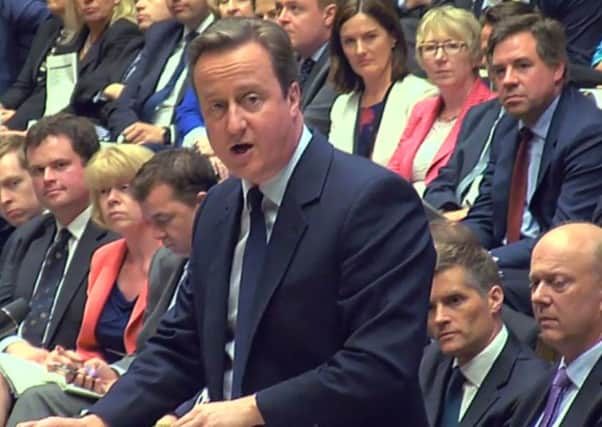David Cameron insists UK economy can survive Brexit


The Prime Minister will warn his counterparts that the UK will not be rushed into Brexit negotiations.
He said the process of withdrawal risked becoming an “unmanaged exit” if Article 50 of the Lisbon Treaty – which triggers a strict two-year timetable – was invoked too early.
Advertisement
Hide AdAdvertisement
Hide AdMeanwhile, the Conservative party is to accelerate the timetable for choosing Mr Cameron’s successor, with nominations closing this Thursday and a new leader – and prime minister – to be in place by September 2.
Mr Cameron had said his successor should be chosen by the time of the Conservative Party conference, which starts on October 2.
But the executive committee of the party’s backbench 1922 Committee agreed to speed up the process. They also agreed unanimously the contest should be run under the same rules as 2005, which will see MPs pick two candidates to put to the wider membership.
Advertisement
Hide AdAdvertisement
Hide AdFormer London Mayor and leading Leave campaigner Boris Johnson remains the favourite, with Home Secretary Theresa May, who backed Remain, leading a pack of at least ten senior figures tipped to be contenders.
Chancellor George Osborne, in his first public appearance since the referendum, made an early-morning statement yesterday designed to calm the markets, acknowledging the coming months would not be “plain sailing”, but insisting the UK was strong enough to weather the storm. He did not announce an immediate emergency Budget to raise taxes despite saying during the referendum campaign that would be necessary in the event of a Brexit vote. However, he left the door open to such a budget in the autumn.
Despite Mr Osborne’s attempt at reassurance, the pound later dropped to a 31-year low against the US dollar and more than £40 billion was wiped off the value of Britain’s biggest companies as the FTSE 100 Index fell 2.6 per cent.
The UK suffered a further blow as US ratings agency Standard & Poor’s (S&P) stripped Britain of its top credit grade following a similar move by Moody’s on Saturday.
Advertisement
Hide AdAdvertisement
Hide AdS&P downgraded the country’s sovereign rating by two notches, from AAA to AA, warning the Brexit vote would lead to “a less predictable, stable and effective policy framework in the UK”.
Angus Robertson, SNP leader at Westminster, used the opportunity of a statement to the Commons by the Prime Minister to stress the fact that a majority of people in Scotland voted for Remain.
And he told MPs: “We have no intention whatsoever of seeing Scotland taken out of Europe. That would be totally, totally unacceptable.
“We are a European country and we will stay a European country.
Advertisement
Hide AdAdvertisement
Hide Ad“If that means we have to have an independence referendum to protect Scotland’s place then so be it.”
In his statement, Mr Cameron said the government had a “fundamental responsibility to bring our country together” after the referendum.
He said: “It’s clear that markets are volatile, there are some companies considering their investments and we know this gong to far from plain sailing.
“However we should take confidence from the fact that Britain is ready to confront what the future holds for us from a position of strength. As a result of our long-term plan we have one of the strongest major advanced economies in the world. We are well placed to face the challenges ahead.”
Advertisement
Hide AdAdvertisement
Hide AdHe resisted European pressure for a quick resolution to the situation and said it would be for his successor to trigger the negotiation of a new relationship.
Ahead of today’s European Council meeting in Brussels, Mr Cameron revealed he had spoken to German Chancellor Angela Merkel, President Hollande of France and a number of other European leaders.
He said: “We’ve discussed the need to prepare for the negotiations and particularly the fact that the British Government will not be triggering Article 50 at this stage. Before we do that we need to determine the kind of relationship that we want with the EU.That is rightly something for the next Prime Minister to decide.”
Meeting in Berlin, the leaders of Germany, France and Italy slapped down calls from Boris Johnson for informal discussions on future relations before the official triggering of Article 50.
Advertisement
Hide AdAdvertisement
Hide AdGerman Chancellor Angela Merkel said: “There are no informal talks about the exit of Great Britain before an application for exiting the EU has been submitted to the European Council.”
Mr Cameron told MPs it was important for Britain to maintain the “strongest possible” economic links with the EU as well as its extensive security co-operation.
“Britain is leaving the European Union, but we must not turn our back on Europe or the rest of the world,” he said.
“I believe we should hold fast to a vision of Britain that wants to be respected abroad, tolerant at home, engaged in the world and working with our international partners to advance the prosperity and security of our nation for generations to come.”
Advertisement
Hide AdAdvertisement
Hide AdHe strongly condemned abuse of members of ethnic minority communities reported after last week’s vote as well as “despicable” graffiti daubed on a Polish community centre.
Earlier, Boris Johnson sought to reassure EU nationals living in the UK that their status would not be affected.
“It is absolutely clear that people from other European countries who are living here have their rights protected,” he said.
“All that people want to see is a system that is fair, impartial and humane to all people who come here from around the world. People from the UK living in the rest of the EU will also have their rights completely protected.”
Other leadership contenders could include Health Secretary Jeremy Hunt, Work and Pensions Secretary Stephen Crabb and Environment Secretary Amber Rudd.